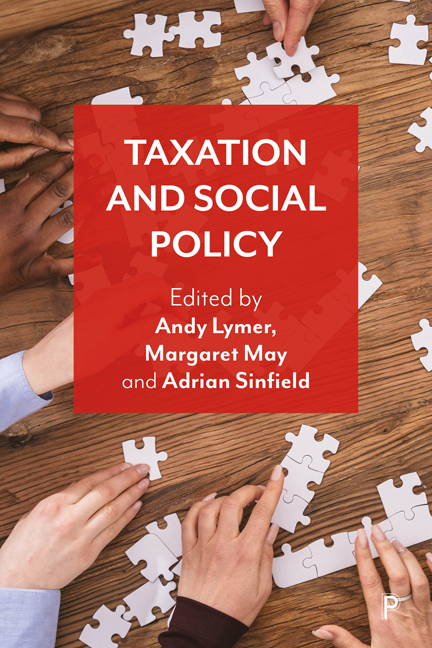Book contents
- Frontmatter
- Contents
- List of figures and tables
- List of abbreviations
- Notes on contributors
- Acknowledgements
- 1 Introduction: The case for considering taxation and social policy togethe
- 2 Fiscal and social policy: two sides of the same coin
- 3 Tax and the social policy landscape
- 4 Fiscal welfare and tax expenditures
- 5 Employment, self-employment and taxation
- 6 Pensions and taxation
- 7 Tax, benefits and household income
- 8 Taxation, health and social care
- 9 Homes, housing and taxation
- 10 Wealth taxation: the case for reform
- 11 Gender and taxation
- 12 Taxation and local taxes
- 13 Corporate tax and corporate welfare
- 14 The climate crisis and taxation
- 15 Conclusions: Taxation in a social policy context
- Index
10 - Wealth taxation: the case for reform
Published online by Cambridge University Press: 20 January 2024
- Frontmatter
- Contents
- List of figures and tables
- List of abbreviations
- Notes on contributors
- Acknowledgements
- 1 Introduction: The case for considering taxation and social policy togethe
- 2 Fiscal and social policy: two sides of the same coin
- 3 Tax and the social policy landscape
- 4 Fiscal welfare and tax expenditures
- 5 Employment, self-employment and taxation
- 6 Pensions and taxation
- 7 Tax, benefits and household income
- 8 Taxation, health and social care
- 9 Homes, housing and taxation
- 10 Wealth taxation: the case for reform
- 11 Gender and taxation
- 12 Taxation and local taxes
- 13 Corporate tax and corporate welfare
- 14 The climate crisis and taxation
- 15 Conclusions: Taxation in a social policy context
- Index
Summary
Introduction
This chapter argues that wealth taxation in the UK is over-ripe for reform. The chapter starts by reviewing the current system in the UK, pointing out that it is barely ‘a system’ at all. Indeed, there is not even a clear or agreed definition of what wealth taxation is or why it exists in different forms. Nevertheless, some taxes are clearly linked to wealth in different ways, and the chapter reviews these along with data on how much revenue is raised from them in the UK.
The chapter then sets out the case for reform of wealth taxation, which it argues can help reduce wealth inequality, increase equality of opportunity, raise much-needed revenue for public investment, simplify the system and increase tax equity and efficiency in the use made of wealth. The case is powerful, but there are also barriers to reform that help explain the lack of reform over the last few decades in the UK. These barriers include concern about low revenues raised by wealth taxes in contrast to high administrative costs (linked partly to issues of disclosure and valuation); high levels of avoidance and evasion; the risk that investors or entrepreneurs will move (their capital) elsewhere and/or people will be discouraged from saving and investing; and opposition from both wealthy, powerful groups and the wider general public. These barriers may seem insurmountable, but they are not as great as sometimes claimed. A common thread emerges here in that the dominance of certain ideas about wealth, inequality and taxation serve to maintain the current approach to the benefit of the wealthy. The chapter concludes by suggesting a way forward to challenge these ideas and achieve reform.
The UK's current ‘system’ of wealth taxation
The current UK wealth tax system is complex and lacks a clear set of objectives (Rowlingson and McKay, 2011; Summers, 2021). Indeed, there are different views about what ‘wealth taxes’ are. One way of defining and categorising wealth taxes is to focus on taxes that affect different kinds of assets.
- Type
- Chapter
- Information
- Taxation and Social Policy , pp. 164 - 181Publisher: Bristol University PressPrint publication year: 2023

